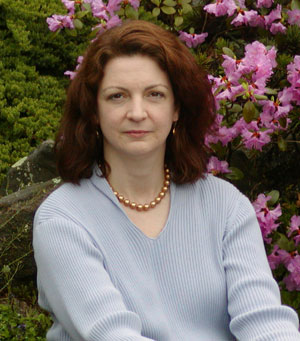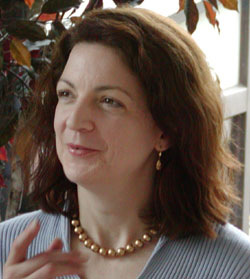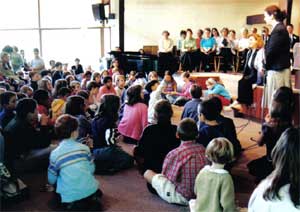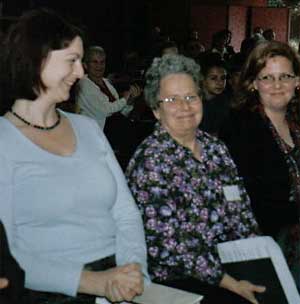Announcing
SNUUC’s new minister: Rev. Catherine Torpey
 The
South Nassau Unitarian Universalist Congregation is very pleased to announce
that we have called Catherine Torpey to be our settled minister. After
attending Catherine’s services and participating in a jam packed,
informative and fun candidating week in the Spring of 2005, the congregation
met on Sunday May 15 and overwhelmingly voted to call Catherine to SNUUC.
The champagne toast and overabundant coffee hour that followed was a happy
affair. The
South Nassau Unitarian Universalist Congregation is very pleased to announce
that we have called Catherine Torpey to be our settled minister. After
attending Catherine’s services and participating in a jam packed,
informative and fun candidating week in the Spring of 2005, the congregation
met on Sunday May 15 and overwhelmingly voted to call Catherine to SNUUC.
The champagne toast and overabundant coffee hour that followed was a happy
affair.
Catherine was born in Darien CT and attended the University
of Chicago where she received a bachelor's degree in history. She later
graduated from Union Theological Seminary in New York City. While in seminary
she worked at the Unitarian Church of All Souls in New York City. She
began her full time ministry as Minister for Youth and Young Adults at
All Souls in Tulsa OK. She has also worked as an interfaith Campus Minister
and coordinator of interfaith and community services. She taught theology
in two Catholic High Schools. Along the way, Catherine has served on the
board of a number of non profit organizations focused on social justice
issues. In her spare time she's developed an expertise in church fundraising
and capital campaigns. In May of 2005 she finished three years of part
time internship at the Community Unitarian Church in White Plains NY.
The following text is an extract from some of the
questions we posed to Catherine in the process of choosing her (and her
choosing us!) to become our next minister:
Thoughts on Worship
To worship is to set aside time to remember what is of greatest worth
to us. Sunday morning worship should be an opportunity for each congregant
to experience themselves as whole: to have an attitude of love and acceptance
toward their inner selves, to have an attitude of love and acceptance
toward those who are gathered into community, and to search for truth
and meaning in life.
 Worship
should be beautiful. The physical space should be attractive, and the
music should be of high quality. Beauty allows the congregants to feel
a sense of joy and appreciation toward life. Sermons and readings should
have enough intellectual appeal to foster the sense of wholeness, since
our intellect is a part of who we are. However, every part of the service
should serve to create a holistic worship experience. A holistic experience
is one that engages the mind and the heart; it leaves one feeling both
more accepting of one’s faults and yet determined to make important
changes; it leaves one more comfortable alone and yet more committed to
community. Worship is not a lecture, a class, a concert or a performance.
It is a sacred time set apart to foster the spiritual lives of those who
gather. Worship
should be beautiful. The physical space should be attractive, and the
music should be of high quality. Beauty allows the congregants to feel
a sense of joy and appreciation toward life. Sermons and readings should
have enough intellectual appeal to foster the sense of wholeness, since
our intellect is a part of who we are. However, every part of the service
should serve to create a holistic worship experience. A holistic experience
is one that engages the mind and the heart; it leaves one feeling both
more accepting of one’s faults and yet determined to make important
changes; it leaves one more comfortable alone and yet more committed to
community. Worship is not a lecture, a class, a concert or a performance.
It is a sacred time set apart to foster the spiritual lives of those who
gather.
As a minister, I seek to work with a team of people
(lay or professional) to create this holistic experience. I see myself
as a kind of director; it is my responsibility to see that each service
is beautiful, well-organized, and that each part—no matter how seemingly
minor—works together. I expect to work closely with the music director
or music minister in order to see that each piece is integrated into the
total worship experience. The readings and the music should work together,
for instance, to create a certain mood. I seek to develop a team of worship
associates who would participate by reading, beautifying the chancel,
sharing or making announcements, depending on their preferences. I avoid
at all costs being a “one woman show” on Sunday mornings.
I seek in working with congregants to strengthen their understanding of
worship and the skills needed to facilitate a powerful experience for
others.
Excellent preaching is not the only factor in creating
meaningful worship, though. Full participation by the congregation, in
cooperation with the minister, is what makes worship an affirming and
empowering act week after week. In order for worship to be meaningful,
it must be in keeping with the already-existing culture of the congregation,
and to serve the real needs of the actual people who are there. It is
therefore by definition a community endeavor.
What do you see as the role of music and the
arts in the life of a congregation?
Music and the arts are vital parts of the
spiritual life of a community. In my experience, they are usually tacked
onto worship, rather than being integrated for a holistic experience.
The aesthetic aspect of Sunday morning is far more important than the
credit we sometimes give it. I would wish for the highest level of music
and arts on Sunday mornings, but every piece of music, every piece of
art, must serve the worship experience as a whole. I would discourage
music-as-concert during worship. I would expect, as minister, to work
very closely with those providing music so that we are offering parishioners
a deeply moving, integrated experience. The arts during Sunday morning
worship must not draw attention to themselves; rather, they must draw
each parishioner's attention to their own inward hearts and to the joy
of being in community.
In the life of a congregation other than Sunday mornings,
participation in the arts can be vitally important to the development
of a personal spiritual life. In this context, the object is not to produce
high quality art; it is, rather, to produce a high quality experience
of our creative selves.
 What
is your approach to the religious education of children, youth, and adults? What
is your approach to the religious education of children, youth, and adults?
Having a well-paid professional Director of Religious
Education should be a high priority for any congregation. I believe that
children and youth deserve the highest quality program, with well-trained,
loving adults and attractive classrooms. The Sunday morning program for
children and youth should foster an atmosphere of acceptance, love and
joy. Children must be steeped in the traditions of the congregation, Unitarian
Universalism, and liberal religion. They must be encouraged to articulate
what is special about this community of which they are a part. The children
and youth should regularly have meaningful participation in Sunday morning
worship with the adults, and they must have a worship experience every
week that is age appropriate.
Adult education is vitally important as well, as it is
the means by which adults come to know one another more deeply, and by
which they develop personally. As with children and youth, adult education
should foster love and caring for one another, a strong emotional bond
with the congregation and its traditions, and the fostering of a personal
spiritual life.
Thoughts on Pastoral Care
If a congregation is to truly be a community, then
the pastoral needs of members must be seen as the community’s responsibility.
I seek to do my best pastoral work by helping each member of the congregation
to connect in healthy ways with as many others as they can. By building
a caring, vibrant community, we help one another to weather storms, and
there can be many eyes and ears watching for when someone is in need.
 As
the minister, when there is a serious problem with a parishioner, I will
be there. If a member is hospitalized, if a house burns down, or if someone
is simply depressed, I consider it my solemn duty to respond to that person’s
need immediately. It is one of the great blessings of ministry to be able
to be with families or individuals at times of their greatest need. Any
minister must engage in self-care and have clear boundaries, so that she
has the emotional reserves she needs to be able to respond effectively
to those in crisis. I see efforts to protect my personal time and space
as a means of ensuring that I will be able to give emotionally to others
when crises come. As
the minister, when there is a serious problem with a parishioner, I will
be there. If a member is hospitalized, if a house burns down, or if someone
is simply depressed, I consider it my solemn duty to respond to that person’s
need immediately. It is one of the great blessings of ministry to be able
to be with families or individuals at times of their greatest need. Any
minister must engage in self-care and have clear boundaries, so that she
has the emotional reserves she needs to be able to respond effectively
to those in crisis. I see efforts to protect my personal time and space
as a means of ensuring that I will be able to give emotionally to others
when crises come.
It is very important to me as a minister to foster an
environment where the community as a whole sees itself as responsible
for the well-being of each member. As minister, I would focus much of
my energy on fostering strong relationships with lay leaders in order
to help them to reach out to others. I would encourage small group ministries
in the congregation, in order to facilitate friendship and genuine caring
among all members. I find that it is in doing so that a community begins
to understand itself truly as a community.
Members need support in learning how to care for one another
while maintaining reasonable boundaries. One or two very needy individuals
can take up an inordinate amount of a minister’s or a congregation’s
time. One of the most difficult tasks for compassionate people, including
myself, is learning to accept that we cannot fix every problem that every
person has. A healthy institution will welcome all people, no matter how
needy they may be, and yet not allow the needs of any individual to distort
the healthy dynamic of the congregation as a whole.
In the final analysis, a congregation has no point if
it is not taking care of those in need within its walls. All the great
worship experiences, all the community activism, all the educational programs
mean nothing if members of the congregation are lonely and isolated from
one another. The basis of pastoral care is an ethos of love.
How would you wish to function in the communities
beyond the local congregation?
I consider it a must for a congregation to
be actively involved in seeking to fulfill the material and spiritual
needs of the community in which it finds itself. I expect the congregation
I serve to be actively engaged in social justice work. I do not expect
that everyone in the congregation will agree on the politics or strategies
for achieving social justice, and so I would foster a wide variety of
ways in which members can serve the community. Some will feed the homeless;
some will attend protest rallies; some will have local political figures
come speak to the congregation about prison issues; some will tutor children.
Ideally, all will be engaged in at least one activity.
What involvement do you desire in the stewardship
of a congregation, most particularly its financial affairs?
In my business as a consultant, I have substantial
experience in helping congregations raise money. Most congregations do
not have a good history with raising money. If this is the case in the
congregation I am called to, then I would like to be very involved in
guiding the canvass process. I would expect to either train members, or
find some other appropriate person to do some training. It would be my
goal to turn the members into great fundraisers; not to do the work of
the canvass for them.
Theological orientation: What is your dominant
theology, and how do you deal with other Unitarian Universalist theologies
with which you may not be in sympathy?
I am a theist. I am comfortable with traditional
theological language, including liturgical use of the word “God,”
and I incorporate any religious words and ideas which help me give clearer
expression to my faith. For instance, I am deeply influenced by Zen ideas
of being "present in the moment" and having "beginner's
mind." I expect those who disagree with me to use the language and
express the theology which most makes sense to them. I do not believe
that we help one another grow theologically by avoiding saying things
out of fear that someone somewhere might object. Rather than watering
down my thoughts or language, I deal with those whose theologies differ
with mine by inviting dialogue; I invite interested members to share their
own spiritual journeys and theological views. Depending on the culture
of the congregation, inviting others to share their theological perspectives
during Sunday worship can be an effective way to encourage all members
of the congregation to articulate their faith. It is my experience that
the more clearly I state my personal theology, the more others are encouraged
to do the same. As minister, my obligation is to state my beliefs courageously
and clearly, while doing so in a way that invites others in, rather than
excluding them. I do not expect everyone to agree with me; but I do expect
that we gather together in the spirit of love and mutual encouragement.
|


